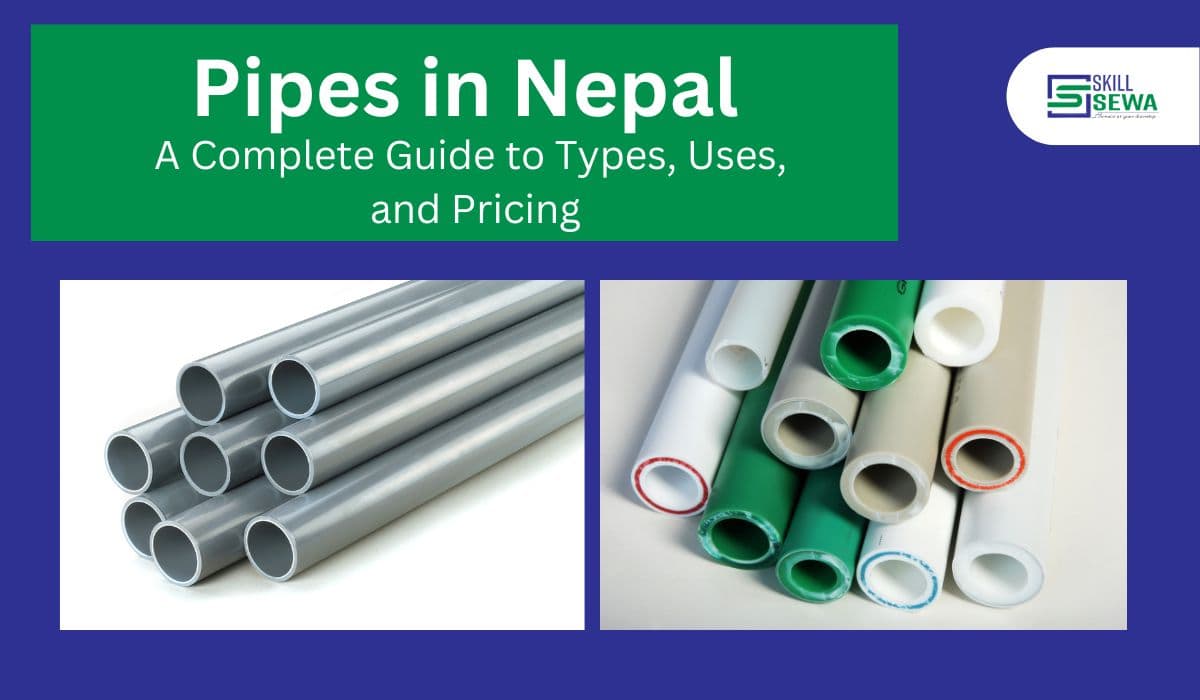Pipes in Nepal: A Complete Guide to Types, Uses, and Pricing

Nepal uses various types of pipes for plumbing, irrigation, and construction, each designed for specific applications. The most commonly used types of pipes in Nepal include:
- PVC Pipes – Lightweight, corrosion-resistant, and ideal for water supply and drainage.
- CPVC Pipes – Heat-resistant and suitable for hot and cold water systems.
- UPVC Pipes – Durable and commonly used in water distribution and sewage systems.
- GI Pipes (Galvanized Iron) – Strong and long-lasting, preferred for water and gas pipelines.
- HDPE Pipes – High flexibility and strength, used in industrial and irrigation projects.
- PPR Pipes – Energy-efficient and suitable for hot and cold water applications.
Each pipe type varies in price, durability, and application, making it essential to choose the right one based on your needs. Read on for a detailed breakdown of their uses, advantages, and market prices in Nepal.
Pipes are an essential part of construction, plumbing, and irrigation systems in Nepal. Choosing the right type of pipe ensures durability, cost-effectiveness, and efficiency. Whether for home plumbing, water supply, drainage, or industrial use, understanding different types of pipes in Nepal can help you make an informed decision.
In this guide, we’ll explore the types of pipes available in Nepal, their uses, pricing, and factors to consider before buying.
Types of Pipes Available in Nepal
1. PVC Pipes (Polyvinyl Chloride Pipes)
PVC pipes are widely used for plumbing, irrigation, and drainage systems in Nepal. They are lightweight, corrosion-resistant, and affordable.
✅ Advantages:
Rust and corrosion-resistant
Affordable and lightweight
Easy to install and maintain
❌ Disadvantages:
Not suitable for high-temperature applications
Can become brittle over time
2. CPVC Pipes (Chlorinated Polyvinyl Chloride Pipes)
CPVC pipes are an upgraded version of PVC pipes with better heat resistance. They are commonly used for hot and cold water supply systems.
✅ Advantages:
High heat resistance (up to 93°C)
Durable and long-lasting
Low maintenance
❌ Disadvantages:
More expensive than PVC pipes
Brittle in extremely cold temperatures
3. GI Pipes (Galvanized Iron Pipes)
GI pipes are made of iron or steel coated with zinc to prevent rusting. They are commonly used for water supply and gas pipelines.
✅ Advantages:
Strong and durable
Suitable for high-pressure applications
Resistant to mechanical damage
❌ Disadvantages:
Heavy and difficult to install
Prone to internal rusting over time
4. HDPE Pipes (High-Density Polyethylene Pipes)
HDPE pipes are flexible, durable, and resistant to chemicals. They are widely used in water supply, gas pipelines, and drainage systems in Nepal.
✅ Advantages:
Highly durable and flexible
Corrosion and chemical-resistant
Suitable for underground installations
❌ Disadvantages:
Requires special fittings for installation
Slightly expensive compared to PVC pipes
5. PPR Pipes (Polypropylene Random Copolymer Pipes)
PPR pipes are commonly used for hot and cold water supply. They are highly durable and have a long lifespan.
✅ Advantages:
High heat resistance (up to 95°C)
Leak-proof and non-toxic
Long lifespan (50+ years)
❌ Disadvantages:
Expensive compared to PVC and GI pipes
Requires specialized installation tools
6. Concrete Pipes (RCC Pipes)
Reinforced Cement Concrete (RCC) pipes are used for large drainage systems, sewage systems, and culverts in Nepal.
✅ Advantages:
Extremely strong and durable
Resistant to weather and external forces
Ideal for large-scale drainage systems
❌ Disadvantages:
Heavy and difficult to transport
Expensive installation costs
Uses of Pipes in Nepal
Pipes in Nepal are used for various applications, including:
Water Supply: PVC, CPVC, GI, and HDPE pipes are used for municipal and household water distribution.
Plumbing Systems: PPR and CPVC pipes are commonly used for hot and cold water in homes.
Drainage & Sewage: RCC, HDPE, and PVC pipes are used in underground drainage systems.
Irrigation: HDPE and PVC pipes are widely used in farming for drip irrigation and water supply.
Industrial Applications: GI and HDPE pipes are used for industrial fluid transportation and gas pipelines.
Factors to Consider Before Buying Pipes in Nepal
✅ 1. Purpose of Use
Choose pipes based on whether they will be used for plumbing, drainage, irrigation, or industrial needs.
✅ 2. Durability & Lifespan
Invest in pipes that offer long-term durability to avoid frequent replacements.
✅ 3. Budget & Cost
Compare the price of different types of pipes and choose one that fits your budget without compromising quality.
✅ 4. Weather & Temperature Resistance
If installing in areas with extreme temperatures, select pipes with high heat or cold resistance (e.g., CPVC or PPR pipes).
✅ 5. Installation & Maintenance
Some pipes require specialized tools and fittings for installation. Consider ease of maintenance and repair.
Price of Pipes in Nepal
The cost of pipes in Nepal varies depending on the material, size, and brand. Below is an estimated price range:
Note: Prices may vary based on market demand and brand.
Best Pipe Brands in Nepal
Some of the most popular pipe brands in Nepal include:
Nepatop – Known for PVC and CPVC pipes
RMC Pipes – Specializes in RCC pipes
Asian Pipes – Offers HDPE and PPR pipes
Triveni Pipes – Manufacturer of GI and HDPE pipes
Conclusion
Choosing the right pipes in Nepal depends on the purpose, durability, and budget. Whether for home plumbing, irrigation, drainage, or industrial applications, understanding different types of pipes and their pricing can help you make an informed decision.
For long-lasting and efficient piping solutions, always buy from trusted brands and consult with professionals before installation. Investing in high-quality pipes ensures better performance, safety, and reduced maintenance costs in the long run.